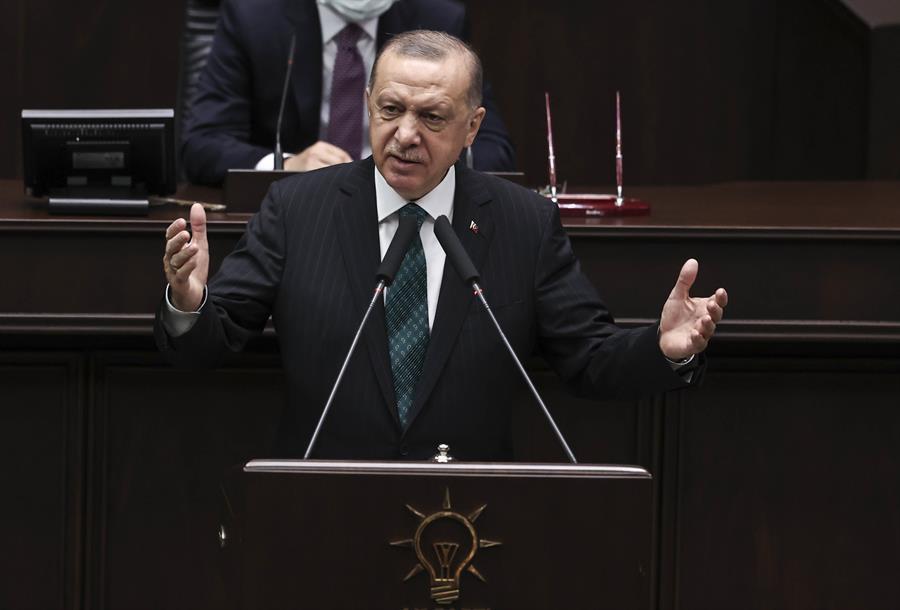
Turkey will not negotiate anything but the two-state formula for resolving the decades-old deadlock in Cyprus, President Recep Tayyip Erdoğan has said, slamming both Greece and Greek Cyprus for their continued ignorance of the presence and rights of the Turkish Cypriot community on the island.
“There is no way out in Cyprus other than a two-state solution. Whether you accept it or not,” Erdoğan said in his weekly address to the Justice and Development Party (AKP) group at the parliament on Feb. 10.
“When we look at the recent statement of the Greek and the Greek Cypriots sides, we see there is not the slightest change in their attitude, ignoring the Turkish Cypriots,” he said.
Erdoğan referred to the statement by Greek Prime Minister Kyriakos Mitsotakis and Greek Cypriot leader Nicos Anastasiades at a press conference on the island earlier this week, who have reiterated that the only solution to the Cyprus problem was a “bizonal, bicommunal federation.”
Erdoğan’s strongly-worded statement came weeks before the convention of the 5+1 meeting with the participation of Turkish and Greek Cypriots as well as the three guarantor countries - Turkey, Greece and the United Kingdom - under the U.N. auspices.
Efforts to find a solution to the problem using the old formulas, including a federation, are meaningless, Erdoğan said, suggesting a new and result-oriented understanding for the Cyprus problem in line with the spirit of the new era.
After the election of Ersin Tatar as the president of Turkish Cyprus, Turkey and Turkish Cyprus do loudly voice their intention to negotiate a two-state solution to the problem as the Greek Cypriots rejected the Annan Plan in 2004 and denied to share the power with the Turkish Cypriots in mid-2017 during the Crans-Montana talks.
Erdoğan accused Greek Cypriots of not sharing the hydrocarbon revenues of the island with the Turkish Cypriots and of trying to aggravate the existing embargoes imposed by the U.N. on their neighbors.
Informing that a large delegation from Ankara under the leadership of Vice President Fuat Oktay is holding talks in the northern part of the island, Erdoğan said, “We will launch a very comprehensive study in the TRNC to support it. We will carry out intense work from Varosha to Dipkarpaz. We will turn northern Cyprus into a very modern state.”
“The whole world should know that we will no longer let the Turkish Cypriots be the sufferers of the half-century-old deadlock on the island,” he added.
Erdoğan slams Mitsotakis
Erdoğan also slammed Mitsotakis over his anti-Turkey statements on his visit to Greek Cyprus. Mitsotakis has voiced baseless accusations against Turkey in regards to the 1974 military intervention of the Turkish army to stop the atrocities committed by the Greek and the Greek Cypriots against the Turkish community.
Erdoğan recalled that the Turkish and Greek diplomats held a meeting in Istanbul in late January in order to discuss the ways to solve the problems stemming from the Aegean and Mediterranean, but Mitsotakis’ statements are poisoning this environment. The Turkish president said Turkish-Greek talks under these conditions would not be doable.
“Don’t challenge me, know your place. If not, it means that you broke the table and ran away,” Erdoğan said, indirectly advising the prime minister not to trust the countries that would support Greece.
“You’ll get no benefit from any of them. But we take matters into our own hands, you should better know the crazy Turks,” he added.
Turkey and Greece could de-escalate tension in the eastern Mediterranean as a result of Germany’s mediation and prevention of tough sanctions against Turkey in late December. Turkey’s suspension of its hydrocarbon activities in the eastern Mediterranean paved the way for the resumption of technical talks between the two neighbors.
They will likely continue talks in early March in Athens weeks before the EU Council’s meeting where the ties with Turkey will be one of the top issues.